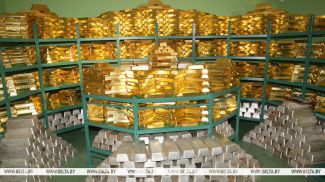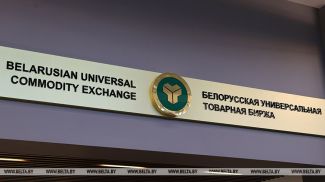MINSK, 22 July (BelTA) – Belarus needs to set up a national fund for storing radioactive waste by 2030, BelTA learned from Belarusian Energy Minister Viktor Karankevich.
The establishment of a special department and a national operator for managing radioactive waste was discussed during the government conference held by Belarus President Aleksandr Lukashenko on 22 July. “Instructions were given to polish the draft presidential decree that had been presented. The work will begin soon to prepare the final edition and submit it for consideration of the head of state,” the energy minister said.
The government suggests setting up a special department for managing radioactive waste and a specialized organization. The work will not be limited purely to the waste of the Belarusian nuclear power plant. Sources of ionizing radiation are actively used in various areas such as science, healthcare, production sector, and defense industry.
During the government conference the president pointed out that nuclear waste is not only a dangerous substance but a very precious raw material. “Today we have to decide what we are going to do with this most precious yet very dangerous and previously unknown to us product. It is a serious matter and a great treasure,” the head of state stated. “International practice indicates that a nationwide system is necessary for managing such waste. We are actually talking about a new branch of the economy.”
During the government conference Energy Minister Viktor Karankevich explained that at present radioactive waste, which is generated in the course of using sources of ionizing radiation, is processed and stored by the Ekores enterprise of the Minsk City Executive Committee. The technologies the enterprise uses are outdated. Its radioactive waste storage facilities were built in the 1960-1970s and require modernization.
Apart from that, it is necessary to make decisions on handling the radioactive waste, which was generated in the course of implementing military programs of the Soviet Union and is still stored in so-called historical storage facilities.
However, the Belarusian nuclear power plant will be the largest source of radioactive waste. A dedicated facility needs to be built for storing the nuclear power plant's waste for the duration of its service life.
After the government conference the energy minister told media that some of the fuel of the nuclear power plant needs to be reloaded periodically. The spent fuel is stored for some time at premises of the nuclear power plant. After that it needs to be processed and moved to long-term storage or to a burial site. “This is why in ten years we will need such storage facilities in Belarus,” he said.
The Energy Minister noted that according to the existing agreements spent nuclear fuel will be transported to Russia for processing. The resulting low-activity and medium-activity waste will have to be stored in Belarus. Viktor Karankevich pointed out that this waste will not be simply buried. It will be stored in a modern facility. “Safe storage will be ensured. World technologies and the relevant equipment will be researched. The best will be used to build the radioactive waste storage facility,” the official stated.
The minister said he expects that this radioactive waste will be utilized one way or another once the relevant technologies are available. “Scientific and technological advance never stops. Technologies to allow utilizing this fuel, this waste may be invented in the future. We expect the relevant technologies to be invented during the storage period,” he said. “It is an international practice and Belarus will embrace it.”
“Considering the commissioning of the first unit and the second unit of the Belarusian nuclear power plant, by 2030 we will need a national fund for storing radioactive waste. We intend to build a sophisticated facility that will be able to collect and store radioactive waste generated not only by the nuclear power plant but by other sources as well,” Viktor Karankevich concluded.











